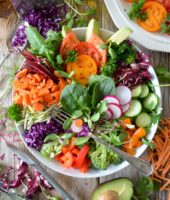My beloved Nana Norma taught me a wonderful tradition that became a touchstone in my life. In her Brooklyn apartment, 303 Beverly Road, Shabbat dinner was always celebrated with her homemade challah. You could smell the sweet aroma of the baking bread as soon as we stepped off the elevator. The smell led us merrily to her front door. When she answered our knock, I’d enter like a cartoon mouse floating towards delicious, buttery aromas.
After dinner, we’d take a large tote and go door to door to collect leftover challah from a few of her dear friends who were neighbors in the building. This was also my Nana’s way of checking in on her friends, catching up on their week, and, looking back, a very loving way to show off her adorable grandchildren (remember, we did not have Facebook back then). I felt like Little Red Riding Hood holding a tote, carrying bread and collecting stories from door to door that would be part of the fabric of my life.
Back at Nana’s, the magic in her kitchen would begin again. She’d tear up the communal bread to soak overnight in cream, vanilla, sugar, eggs, and butter. Love was the extra secret ingredient, she’d say. In the morning, she would bake her incredibly delectable challah bread pudding. I would wake up to the smell which I associated with morning sunshine. We would divide it up so when the neighbors came calling for their portion, it was, yet again, another beautiful opportunity to welcome the day with the gift of giving.
Nana would remind me that breaking bread—sharing a meal—brings neighbors together, whatever their religion or culture. It binds families and communities and embodies humanity.
After she was diagnosed with cancer, I begged her for her challah recipe. I wanted to reassure her that I would continue her tradition and make it exactly as she did when I had a family of my own. I wanted to make sure that the aroma of Nana’s challah bread would be etched in my own children’s memories. I needed to taste her love, hugs, and kisses in every bite. It was the only way I could somehow make sense of the fact she was leaving me. She said there wasn’t a recipe; challah was like life. When I got older, she said, I’d figure it all out on my own. She had tremendous faith in me.
Figuring out adulthood has had its highs and lows. With motherhood came the sensation of being on an endless roller coaster ride. On call 24/7, it’s exhilarating, rewarding, and, at times, scary and nauseating. You must stay on because you’re racing around the track—up, down, and sideways with the occasional loop-the-loop—until the kids go to college. But then what? It felt like everyone had moved on but me. Refusing to be the cliché of an empty-nester waiting for her kids to visit, I challenged myself to figure out the next chapter.
For a period of time, I was committed to learning the craft of writing and storytelling. Describing what I knew, and inventing what I didn’t, stoked the creative spirit that had been dormant for too long. But I discovered it’s a strange business where your creativity is subject to the needs of the network, agents, and advertisers. My story became their story.
I’ve since turned to artmaking, something I’ve enjoyed since I was a child at summer camp. Among its many pleasures is the fact that no one else can weigh in, alter, or take ownership of what is made by your own hands. Wooden spoons feature prominently in my assemblages as both everyday tools and potent symbols. They are extensions of my hands, giving and receiving love—a perfect means for nonverbal storytelling. They communicate my twin passions of artmaking and cooking. They are universal instruments. Their forms are sensual and utilitarian, intimate and practical.
The stories conveyed in each photographic print I make explore the fabric of my life and, as I’ve been told many times, resonate with viewers’ own experiences. They celebrate liberation, passion, risk-taking, reinvention, spirituality, and aspects of life many of us put on hold while on the mommy roller coaster. They also tell stories about handing down traditions and values from one generation to the next, like Nana’s bread pudding ritual.
Nana was right, as grandmothers often are. There is no recipe. I continue to figure things out, but now through a prism—decades of hard-won experience, personal growth, and self-awareness. Along with my love for family and friends, there is joy in doing, creating, experimenting, making, and sharing in my studio and kitchen. Her memory is a blessing and her lessons continue to inspire.
Author: Patti Grabel
Author Bio: Patti Grabel is an artist, writer, and producer based in New York City and Water Mill, NY. As an artist, she works in a range of mediums including painting, drawing, photography, assemblage, and found-object sculpture to explore imagery that reveals narratives that are at once personal and universal, whimsical and poignant, intimate and public.
Her most recent compositions, photographed and printed on paper or glass, feature wooden spoons she has painted, hung to dry on a clothesline, and arranged to tell stories. The narrative threads embrace many themes including nourishment, family, sensuality, creative expression, spirituality, and the liberating and necessary act of taking chances in life.
In addition to their texture and sculptural quality, Patti uses spoons for their metaphorical richness. Everyday tools, they are also nurturing vessels giving and receiving in a single motion. Whether part of a set of heirloom silverware or a humble wooden spoon for stirring, they are used around the globe to make and deliver sustenance.
A selection of works from her Lick the Spoon series and a solo exhibition from her Causing a Stir series were shown at Chase Edwards Contemporary in Bridgehampton, NY, in September 2017 and July 2018, respectively. Most recently, her prints were featured in a monographic presentation at Artiz gallery in New York City. Patti was one of seven artists invited to participate in a project for Bloomingdale’s flagship store in midtown in conjunction with the launch of a new denim department. Her one-of-a-kind denim jeans embellished with spoons, replicas of berries and vines, and embroidery are on display through October.
One of her pieces was included in benefit event supporting Michael Bolton Charities in 2017, and a print was selected for the Museum of Arts and Design’s 2018 MAD Ball and their 60th anniversary Diamond Jubilee Ball in 2017 for the silent auction benefitting the museum. A print was also selected by City Harvest for the silent auction at its BID 2018 benefit event. Patti donates a portion of the proceeds from sales of her prints to City Harvest, a nonprofit organization feeding hungry New Yorkers for over 35 years.
Link to website: www.pattigrabel.com





